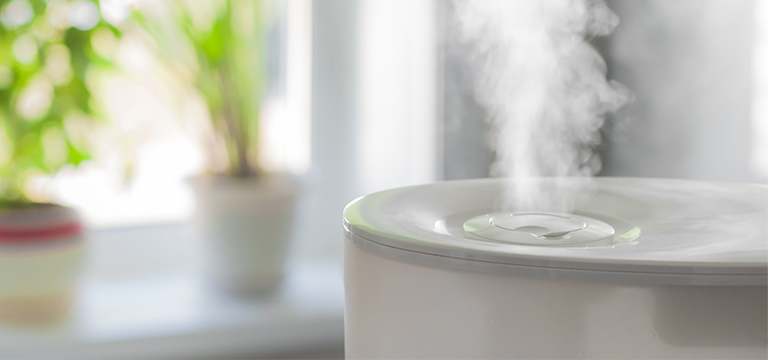The Health Benefits of Humidifiers

When it’s cold outside, you may often notice that your skin, throat and nasal passages are drier than usual. That’s because your house is lacking moisture. When the air is humid, it acts as a natural moisturizer to relieve dryness. What’s the best way to put moisture back into the air inside your home? Use a humidifier.
But how does it work? And is it really beneficial to your health? Here’s everything you need to know about humidifiers.
What’s a humidifier?
A humidifier is a device that adds moisture to the air. It can either have an ultrasonic part that diffuses water into mist or a fan that creates mist. This mist can help relieve dryness as well as ease symptoms normally associated with the common cold, flu, sinusitis or eczema. This includes:
- Dry throat
- Nose irritation or bloody noses
- Dry cough
- Sinus congestion or headache
- Dry skin
- Cracked lips
There are two main types of humidifiers: cool mist or warm mist.
How does a cool mist humidifier work?
Cool mist humidifiers release room temperature water into the air. They are beneficial during the winter when your heating system can lower the humidity by as much as 10% in each room. They’re good for preventing or relieving a sore throat, dry nasal passages and dry skin.
There are three different types of cool mist humidifiers:
- Ultrasonic humidifiers create vibrations that push microscopic droplets of water into the air where they then evaporate and moisturize the room. They are usually quiet and inexpensive, but can also release other materials into the air, including minerals, bacteria and mold—or any leftover chemicals that were used to clean the device.
- Evaporative humidifiers use a fan to blow water through a filter and into the air. The filters are usually disposable so they can be easily replaced. Most are also usually self-regulating, meaning they turn off when the desired humidity level is reached. They tend to be louder than ultrasonic humidifiers.
- Impeller humidifiers use high-speed rotating disks to release small water droplets into the air. They are often inexpensive and child-friendly, but the rotating disk can be noisy. It’s best to regularly clean these devices so they don’t release any impurities into the air.
How does a warm mist humidifier work?
Warm mist humidifiers, also known as steam vaporizers, heat water until it turns into steam and is then released into the air. Heating the water makes them less likely to release water with bacteria or impurities. They are usually less expensive than cool mist humidifiers.
While many people say that warm mist humidifiers help give them immediate relief of congestion, some research suggests that they can actually make symptoms worse—including causing swelling in the nasal passages, which can make it harder to breathe.
Another drawback of warm mist humidifiers or steam vaporizers is that there’s a high risk for burns, making them not child-friendly. It’s recommended that you follow any safety guidelines for use and cleaning that come with these devices.
Anything I should keep in mind when using a humidifier?
No matter the type you choose, always clean and properly maintain your humidifier. Make sure it is fully dry before putting it away after cleaning or use to prevent mold from growing.
Watch out for too much moisture in the air. This can promote mold or bacteria growth.
Humidifiers can potentially release minerals and microorganisms into the air. They are usually not harmful but the residue can affect people with asthma. Using distilled water instead of tap water can help.
A big point to remember: a humidifier should be seen as a helpful home remedy, not a medical treatment. Talk to your doctor before using one and always follow their advice for usage.
Want more health advice and answers?
If you have additional questions about when is the best time to use a humidifier to help relieve dryness, you can use our 24/7 Nurse Line. Speak or chat with a registered nurse who can provide answers to your questions as well as offer advice on when and where to go for care.
Sources:
https://www.healthline.com/health/humidifiers-and-health#types
https://www.verywellhealth.com/choosing-the-right-humidifier-770582
https://www.verywellhealth.com/vaporizer-vs-humidifier-5212237


